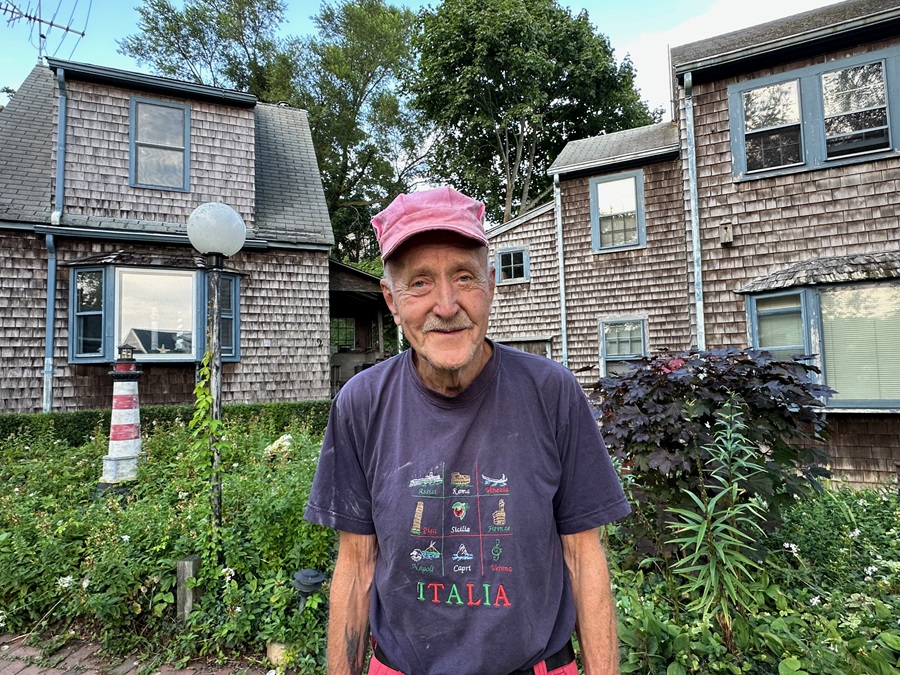PROVINCETOWN — Channing Wilroy takes a brisk walk through town every day, his shoulders rolled slightly forward as if they, too, are in a hurry. He rarely stops, because he rarely has a destination in mind — the point is to keep moving.
“When you stop moving, you die,” Wilroy often says. “Especially at my age, you can’t stop moving.”
Wilroy is 83. He was a dancer on Baltimore’s Buddy Deane Show in the 1950s, an actor in John Waters’s “Trash Trilogy” in the ’70s, and the creator of a cottage oasis on Pearl Street in Provincetown starting in 1979. He built his own cottage three times before he was satisfied with it, he says. “It just didn’t look right the first two times.”

By 1992, Wilroy’s cottage looked right, and he filled it with vinyl records and mementos from his favorite kind of travel: long-distance trains. He and his boyfriend, Hans Roth, rode the whole length of Russia a few years ago on the Trans-Siberian Railway. When the leg from Vladivostok to Beijing was canceled, they flew ahead to catch their last ride, a train to Ulaanbaatar, Mongolia.
“It’s a beautiful country,” Wilroy says of Mongolia. “Miles and miles of nothing but miles and miles.” He recalls looking out the window and seeing 15 or 20 Bactrian camels with riders — and then realizing how far away they must be to appear so small.
Wilroy speaks in short sentences that sometimes feel as if they’ve ended too soon. He is the opposite of showy.
Nonetheless, he found his way into six John Waters films following his success on The Buddy Deane Show, which was Baltimore’s version of American Bandstand, Wilroy says. The show featured teenagers dancing to newly released records, and the host called him “Charming Channing,” often pairing him off to lead the romantic songs.
Waters, who is about five years younger than Wilroy, was obsessed with the show and later made it the basis for the movie Hairspray. He cast “Charming Channing” in Pink Flamingos, Female Trouble, and Desperate Living in the 1970s and then 20 years later put him in Pecker, Cecil B. Demented, and Dirty Shame.
In Desperate Living, nearly every character screams every line, except for Wilroy, who delivers his in a calm baritone. Even in a pilot’s cap and black vinyl pants, he’s the least absurd person in the film.
“He gave me roles that were sexy, is the best way to put it,” says Wilroy. “I often thought John had a crush on me then, but I don’t know that. I never heard it from him.”
Wilroy moved to Provincetown in 1966, though he spent winters in San Francisco for many years. He’s worked in at least half the town’s restaurants as a waiter, bartender, chef, or dishwasher, he says, including as head chef at the Mews in 1973. He opened his own restaurant, Channing’s, in 1975, but closed it after one season.
Mulligatawny soup was the most exotic dish at Channing’s, Wilroy says, but affordably priced lobster was the main attraction. The restaurant, at 386 Commercial St. where the Mews is temporarily located now, made money, Wilroy says, but it didn’t suit him: “I’ll work for you and run your restaurant, but I learned I don’t want to own one,” he says.
He became a waiter at what was then a new restaurant called Front Street instead and bought the cottage colony at 36A Pearl St. a few years later for $50,000.
“I bought it in springtime and the cottages were rented already, but I didn’t know any of the tenants or if they would show up,” Wilroy says. “I called them my surprise party.”
Three cottages needed major repairs, and the other two Wilroy built from the ground up, including the plumbing and electrical work. He wired the yard with lights, too, including a stoplight, two lighthouses, and a railroad crossing sign.

He rents the blue-trimmed cottages seasonally, with some tenants staying for four or five seasons while others leave after only one. His longest-standing tenant has stayed for 22 seasons in a row. His fellow John Waters actor, Mink Stole, lived here one summer, but Wilroy says he tries to avoid renting to friends. And he prefers seasonal rentals because “it’s a lot easier to say goodbye when things aren’t working out.”
Back on Commercial Street, Wilroy is easily recognized by his distinctive railroad conductor caps, which he has worn almost every day since the mid-1980s. He used to buy them at a scenic railway in New Hampshire, but in the early 1990s they stopped selling them and he began to make his own. His current collection tends toward pink canvas and striped denim, but he’s worn every color over the years, including neon green.
“My radio show on WOMR was called The Night Train,” Wilroy says. He played ’50s R&B on vinyl, including the Drifters, Laverne Brown, and Joe Turner. His show aired for five years in the mid-1980s, when disco had given way to pop stars like Michael Jackson and Madonna. Wilroy, however, was spinning blues in a railroad cap, already living in a world he had designed.
